 Instagram
Instagram
Access
Wireless Networks
Research Center
(Yokosuka, Kanagawa)
Headquarters
(Koganei, Tokyo)
Kashima Space
Technology Center
(Kashima, Ibaraki)
NEWS & INFORMATION
NEWS & INFORMATION
- Full Papers Submission: June 30, 2020
- Special Session Proposal: August 1, 2020
- Acceptance Notification: August 16, 2020
- Final Manuscript Deadline: September 1, 2020
Laboratory
World's First Successful 2 Tbit/s Free-Space Optical Communication Using Small Optical Terminals Mountable on Satellites and HAPS
The National Institute of Information and Communications Technology (NICT, President: TOKUDA Hideyuki, Ph.D.) has successfully demonstrated 2 Tbit/s Free-Space Optical (FSO) communication using small optical communication terminals that can be mounted on satellites and HAPS, marking a world first for this technology.
This experiment involved horizontal free-space optical communication between two types of small portable optical terminals developed by NICT: a high-performance FX (Full Transceiver) installed at NICT Headquarters (Koganei, Tokyo) and a simplified ST (Simple Transponder) installed at an experimental site 7.4 km away (Chofu, Tokyo). Despite the difficult conditions of an urban environment with atmospheric turbulence that disrupts laser beams, the system maintained a stable total communication speed of 2 Tbit/s via Wavelength Division Multiplexing (WDM) transmission of 5 channels (400 Gbit/s each). This is the first time in the world that terabit-class communication has been realized using terminals miniaturized enough to be mounted on satellites or HAPS.
Moving forward, NICT plans to further miniaturize the terminals for implementation onboard a 6U CubeSat. NICT aims to conduct free-space optical communication demonstrations at speeds of up to 10 Gbit/s between a Low Earth Orbit (LEO) satellite (altitude approx. 600 km) and the ground in 2026, and between a satellite and HAPS in 2027. Through these experiments, NICT will demonstrate compact, ultra-high-speed data communication capabilities and pave the way for the realization of Beyond 5G/6G Non-Terrestrial Networks (NTN).
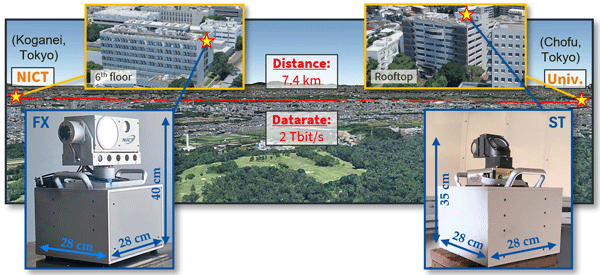
LaboratoryWireless Systems
Laboratory
Japanese Consortium Achieves World's First Demonstration of 5G Communication from Altitude of 4km Using 38GHz Band
Today, a landmark achievement in 5G communication was announced by a collaborative effort involving SKY Perfect JSAT Corporation, NTT DOCOMO, INC., Panasonic Holdings Corporation (Panasonic HD), and NICT.
In a pioneering demonstration, these industry leaders successfully conducted a 5G communication test utilizing the 38GHz band from an altitude of approximately 4km. The test was carried out using a small Cessna aircraft to simulate the potential use of High-Altitude Platform Stations (HAPS). This groundbreaking demonstration marks a significant milestone in telecommunications technology.
The trial aimed to showcase the practical application of 5G feeder link and backhaul line for HAPS. Specifically, the Cessna aircraft was equipped with newly developed communication equipment known as the "Cessna onboard station," designed for eventual deployment in HAPS. Additionally, a lens-type antenna with an auto-tracking function served as the ground station.
During the test, an aerial relay backhaul line was established between the Cessna aircraft, flying at an altitude of approximately 4km, and three ground stations. This was achieved using the 5G New Radio (NR) standard with 38GHz band radio waves, representing a pioneering approach in terrestrial 5G networks.
This successful demonstration represents a significant step forward in the advancement of 5G technology and its potential applications in high-altitude communications. The collaboration between these esteemed organizations highlights the collective effort to push the boundaries of innovation in telecommunications.
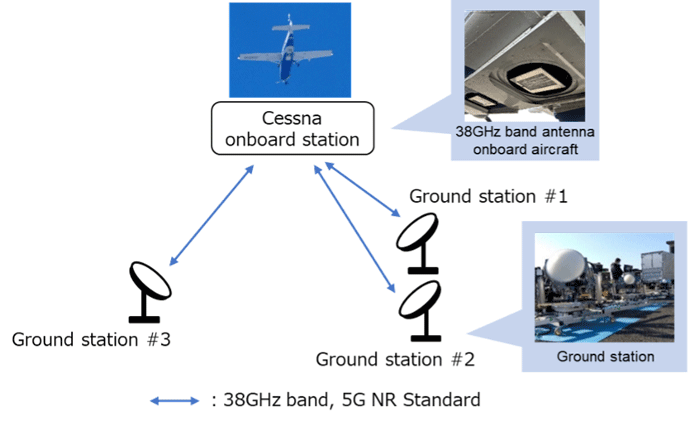
Laboratory
Successful Japan-Europe Joint Experiment on Integration of Satellite Links in Japan-Europe Long Distance 5G Network
NICT has conducted a Japan-Europe joint experiment with Japan Radio Co., Ltd. (JRC), SKY Perfect JSAT Corporation (SKY Perfect JSAT) for connecting satellite and 5G, including Japan-Europe long-distance network. Successful transmission of 5G control-plane signal, 4K video, and IoT data was achieved in January and February of 2022 for the first time in Japan. This experiment was conducted in collaboration with the University of Tokyo, School of Engineering, Nakao Research Laboratory, the European Space Agency (ESA), Eurescom GmbH, and Fraunhofer FOKUS Institute.
This joint experiment shows that 5G communications can be established over long-distance links between Japan and Europe, including satellite links, and be expected to lead to the early spread of 5G networks in places where 5G deployment has been difficult, such as in the sky, at sea, or on remote islands.
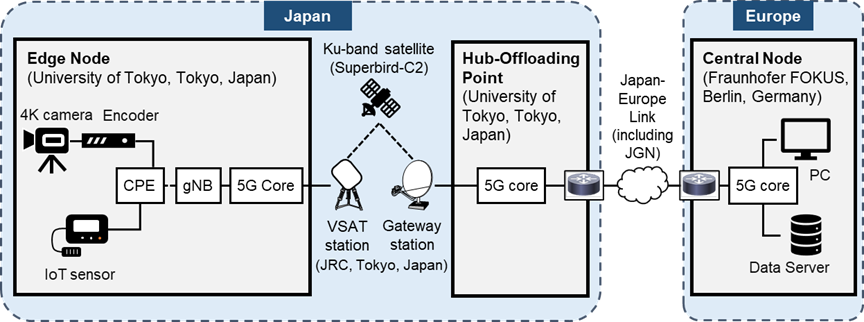
Research Center Wireless Systems
Laboratory
Symposium on the Development of Frequency Resources 2021
The Association of Radio Industries and Businesses (ARIB) and the National Institute of Information and Communications Technology (NICT) will co-organize the Symposium on the Development of Frequency Resources 2021, under the theme of “Looking into the future ICT through Local (Rural) 5G and Beyond 5G / 6G” on July 9 at Meiji Kinenkan and on Zoom webinar.
As the 5th generation mobile communications system (5G) has been launched, expectations are growing for a local (rural) 5G service that will provide a self-employed 5G service that meets the communications requirements for specific areas and applications. In addition, technical studies and discussions have been initiated worldwide on next-generation mobile communications systems, known as “Beyond 5G” or “6G” for the wireless infrastructure that will support Society 5.0 in the future.
The symposium will focus on those wireless communication technologies that will lead to new forms of using frequencies. Experts from industry, academia, and government will give lectures on policies and the R&D, the standardization and expected use cases of the technologies. We look forward to your participation.
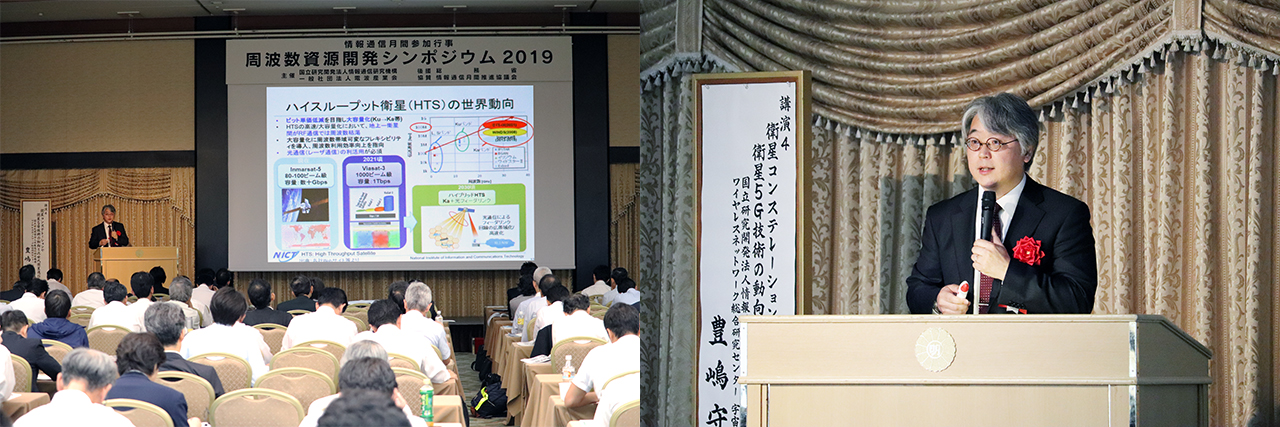
Laboratory
Successful international joint experiment between Japan and Germany in the field of space optical communication using a small satellite
NICT has conducted an international joint experiment with the German Aerospace Center (DLR) between the optical terminal (OSIRISv1) onboard the University of Stuttgart’s Flying Laptop satellite and NICT's optical ground station equipped with newly developed optical bench with fine-pointing system. In February 2021, a success in receiving the downlink light from OSIRISv1 at NICT's optical ground station was achieved.
At the same time, an initial experiment of the newly developed atmospheric turbulence measuring device was performed successfully. Furthermore, a successful demonstration experiment using a simple optical ground station composed of low-cost commercial parts was conducted by receiving laser light from the satellite.
The OSIRISv1 optical terminal uses body pointing for tracking and this is the first time a successful experiment with such implementation is performed in Japan. As a result, valuable experimental data that will contribute to the research and development of future space optical communication technology has been acquired.
Laboratory
Successful Laser Acquisition and Tracking between Optical Data Relay Satellite and Optical Ground Station
NICT and the Japan Aerospace Exploration Agency (JAXA) confirmed that a bidirectional optical link was established between the laser-communication terminal for inter-satellite optical communications (Laser Utilizing Communication System: LUCAS) aboard the Optical Data Relay Satellite, which was launched by the H-IIA F-43 rocket from the Tanegashima Space Center on November 29th, 2020, and the optical ground station at the Okinawa Electromagnetic Technology Center of NICT.
Laboratory
Successful Experiment with Stabilization Technology for Wireless Communications for Manufacturing Systems
NICT and Toyota Motor Corporation (TOYOTA) have succeeded in experimenting with radio stabilization technology for manufacturing systems, and to have realized a "non-stop line". The "non-stop line" enables to detect unregistered terminals brought into manufacturing sites by visualizing radio waves, and also to suppress unplanned radio congestion for avoiding sudden interference by coordinated control of different systems. This time, we have demonstrated these technologies at two TOYOTA plants in operation.
In the future, TOYOTA plans to introduce this visualization technology to other factories sequentially in order to manage wireless systems at manufacturing sites properly. While, NICT will continue to demonstrate experiments of the technology at other TOYOTA plants, and to promote the research and development of the Smart Resource Flow (SRF) wireless platform, with the aim to put it to practical use at the plant.
Laboratory
NICT released "Report Issued by the Study Group on the Integration of Satellite Communications and 5G/Beyond 5G"
NICT released a report summarizing what was discussed in the "Study Group on the Integration of Satellite Communications and 5G/Beyond 5G" (August 2019 - February 2020) to study the effective use of integration of satellite communications and 5G/Beyond 5G, with the participation of domestic terrestrial communications providers, satellite communications providers, satellite-related manufacturers, potential users, universities, research institutes, and standardization bodies.
Research Center Planning Office
New webpage featuring our original videos is now available
NICT Wireless Networks Research Center has published a new webpage that features the original videos introducing our R&D activities and technologies on the latest wireless communications.
We hope the contents will help you to deepen your understanding and interests in ICT.
Fight COVID-19 with ICT!
Research Center Planning Office
Call for papers - The 23rd International Symposium on Wireless Personal Multimedia Communications (WPMC 2020)
NICT and YRP R&D Promotion Committee will co-organize the 23rd International Symposium on Wireless Personal Multimedia Communications (WPMC 2020) as a virtual conference "WPMC 2020 Virtual Edition" on October 18-21, 2020.
Continuing the series, the 23rd WPMC will bring together academia, government, business sectors and standardization bodies to explore activities, trends and future challenges towards innovative societies by bridging wireless and business worlds.
The paper submission deadline has been extended to June 30, 2020.
We are looking forward to your participation.
Laboratory
Small Optical Link for International Space Station (SOLISS) Succeeds in Bidirectional Laser Communication Between Space and Ground Station
The Japan Aerospace Exploration Agency (JAXA), the National Institute of Information and Communications Technology (NICT) and Sony Computer Science Laboratories, Inc. (Sony CSL) has succeeded in establishing a bidirectional laser communication link between SOLISS (Small Optical Link for International Space Station), installed in the Exposed Facility of the Japanese Experiment Module "Kibo" of the International Space Station (ISS) and the optical ground station for satellite communications of NICT, and in transmitting high-definition image data via Ethernet. This marks the first time in the world that bidirectional symmetric Ethernet links have been established by using laser communication devices designed for small satellites.
Laboratory
FFPA Completes Technical Specifications to Stabilize Various Wireless Communication Systems Co-located in Factory Sites
Flexible Factory Partner Alliance (FFPA. Chairperson Andreas Dengel) has created the technical specifications that is aiming for various wireless systems co-located in factory sites to operate stably. The National Institute of Information and Communications Technology (NICT) has proposed Smart Resource Flow (SRF) wireless platform*1 which has been adopted as architecture for the specifications. By adopting this platform, stable wireless communication is realized, making it easy to visualize and interactively manage various information on the manufacturing sites.
The technical specifications define functions and interfaces to provide framework for coordination and coexistence of wireless systems with different standards, of different generations, and by different vendors coexisting in a same factory site.
An overview of the specifications will be presented at the FFPA seminar, “A vision of future factory sites created with the SRF wireless platform ~ Introduction of FFPA technical specifications Version1 ~ ” held on October 31 in Tokyo.
* Development of SRF wireless platform by NICT has been supported by the Ministry of Internal Affairs and Communications Japan for the project entitled “R&D on Technologies to Densely and Efficiently Utilize Radio Resources of Unlicensed Bands in Dedicated Areas” since 2017.Research Center
Feature acticles in the latest issue of NICT NEWS
The latest issue of NICT NEWS (2019 No.5 Vol.477) features the R&D activity in Wireless Networks Research Center and Wireless Systems Laboratory. A variety of hot research projects and researchers are introduced.
Please enjoy it in digital format (PDF) on the website.
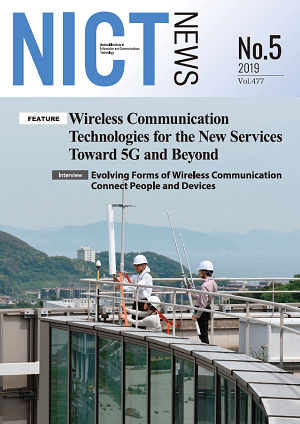
Contact Us
If there is any inquiry, please contact us by using our inquiry form.
 Instagram
Instagram
Copyright © 2019 Wireless Networks Research Center. All Rights Reserved.